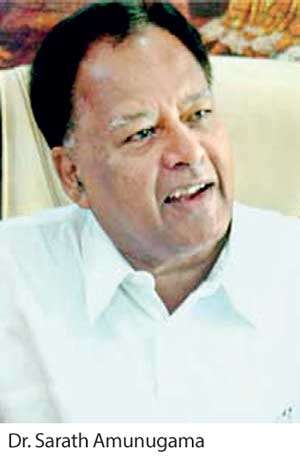08 Jun 2018 - {{hitsCtrl.values.hits}}
 By Shabiya Ali Ahlam
By Shabiya Ali Ahlam
If there is a single most nagging issue in the country’s State sector, it is the weak productivity inherent in the public service which has been dragging the economic growth in the post independence Sri Lanka, and the policy makers, though late have now felt it was time the public servants were retrained for higher productivity.
Minister of Research, Skills Development and Vocational Training Dr. Sarath Amunugama while implying the State sector must be more proactive in its endeavours said the dire need of the hour for Sri Lanka is to up its productivity.
“Our enterprises (State) need to be more productive. The technological revolution is staring at us in the face; so how do we cope with these changes and modernize our procedures.
“All are linked to productivity. We cannot get rid of the existing employees, so we need to retain them so we can make use of them to realize our desired objective,” said the minister.
He made his comments when addressing a forum that aimed at exploring strategies to foster a culture of engagement and boost employee productivity in the State sector.
Dr. Amunugama, who is also the Minister of Science and Kandyan Heritage, added that the authorities must look “inwards”, study the functions of the low-performing entities and only then look at improving them accordingly.
“They may be white elephants (State employees) but they also have their anatomy. Now competition is the name of the game.
“In the post-Trump era, countries are taking ruthless decisions. And to survive that we need to up our game. With an increase in global negotiations in trade and dramatic shifts in policies, our survival boils down to productivity,” he elaborated.
It was also pointed out that despite the private sector being identified as the ‘engine of growth’, it is the public sector that continues to receive greater emphasis in the area of development, and more resources are diverted to uplift its workforce.
However, he acknowledged that despite the effort, little progress has been achieved in that aspect.
The underlying reason for poor productivity in the State sector was attributed to successive government increasing providing employment in the public sector not realizing growth objectives.
Thus, due to that obligation an increased number of persons are employed in the unskilled areas, which calls for new processes and exercises in tackling the productivity problem.
“It is not very useful to blame the workers. I find that many workers are inclined to work and develop their enterprises. They are quite capable of transforming and we need to engage them and today’s question is how well we can do that,” said the minister.
Dr. Amunugama professed that with the allocation of funds for skills development and training, heads of State enterprises must explore newer and modern methods, which include technology, to boost and sustain productivity amongst its employees.
For skills development and vocational training, the ministry was allocated an excess of Rs. 10 billion in the 2018 budget.
Although programmes are being conducted on a regular basis to improve the skills of employees in the State sector, it was pointed out that the majority do not actively engage in such programmes. It was highlighted by State officials that the even though programmes are carried out by foreign resource persons, participants show up for attendance sake and leave midway following lunch.
18 Nov 2024 28 minute ago
18 Nov 2024 1 hours ago
18 Nov 2024 1 hours ago
18 Nov 2024 1 hours ago
18 Nov 2024 2 hours ago